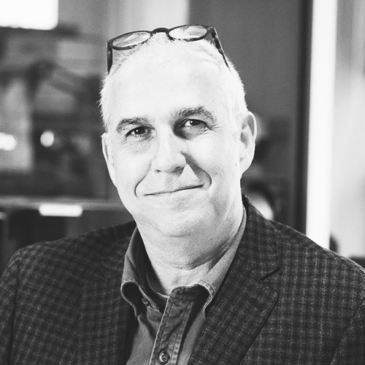Ken Rother is an entrepreneur who has built and exited two successful tech/media startups. His experience is centered in operations, sales, product management, and technology. Mr. Rother is director of Rev: Ithaca Startup Works, which runs several hardware accelerator programs. He also is the managing director of eLab, an accelerator program for Cornell student startups, as well as a visiting lecturer of management at Cornell’s Johnson Graduate School of Management.

Product
DevelopmentCornell Certificate Program
Overview and Courses
You have a great idea for a product. So what’s next?
In this program, you will learn how to bring a product from concept to market launch, becoming fluent in all facets of the product development and manufacturing process. Every great product begins with a prototype, so you’ll build one as a course project and use it to conduct customer discovery interviews. The information you gain from these interviews can then help you iterate your ideas and level up what you can offer customers.
From small-batch manufacturing to large-scale production, the physical product development process is often complex. The courses in this program provide you with a concrete set of best practices and tools that you can download and use to not only complete assigned projects, but also deploy later in your own real-world product development process, such as a production techniques and materials handbook, Gantt charts to plan hiring and production stages, a design checklist, and a funding pitch deck. You will get a chance to virtually “visit” a plastic injection molding company near Cornell University and experience multiple interviews with manufacturing experts and product entrepreneurs. When you have completed the program, you will be well positioned to bring your product ideas to life.
The courses in this certificate program are required to be completed in the order that they appear.
Course list
In this course, you will refine an idea for a physical product by focusing on the customer. Using the Business Model Canvas, you will list your initial assumptions about all aspects of product development, from value propositions to pricing. You will then create a low-cost consumer product prototype and validate it through customer discovery.
You will develop a business model for that product using the Business Model Canvas, then build and test prototypes to gain actionable customer feedback. By the end of the course, you will have discovered the types of companies that can help you prototype.
Please note that time to build the physical product prototypes will add about 1.5 hours to the time spent on the course.
This course requires the purchase of a low-cost physical product kit.
You are required to have completed the following course or have equivalent experience before taking this course:
- Building and Validating Prototypes
You are required to have completed the following courses or have equivalent experience before taking this course:
- Building and Validating Prototypes
- Developing Product Specifications
After you've created a low-volume production run of your product, you are ready to plan for high-volume production. In this course, you will optimize materials costs through increased volume and by designing a product for ease of fabrication. You will reduce the complexity of assembly and product variability to lower assembly costs. You will implement a set of best practices called Design for X, which will help you ensure efficient and inexpensive manufacturing that results in a high-quality physical product. At the end of the course, you will have the tools to design for high-volume production.
You are required to have completed the following courses or have equivalent experience before taking this course:
- Building and Validating Prototypes
- Developing Product Specifications
- Launching Small-Scale Production
Once you have worked out small-scale manufacturing for your physical product, you will explore a framework called Design for X. Design for X encompasses all aspects of planning for high-volume production, where "X" can be Manufacturing, Assembly, Testing, Upgrade, Repair, Sustainability, End-of-Life, Installation, and Start.
Design for X incorporates best practices from the experiences of physical product developers in making a reproducible product. You will apply these ideas to design a large-scale manufacturing process that is efficient and cost effective. This will enable you to reduce the number of steps in the process, build quality into manufacturing, and design for customer ease in the upgrade, repair, and end-of-life of the product, among other considerations. In sum, Design for X will enable you to please your customers with an excellent product that functions as promised.
This course includes a video tour of a contract manufacturing firm near Cornell University. In this video, you will observe the process of plastic injection molding, a common and inexpensive process that many physical product entrepreneurs use to manufacture their products.
You are required to have completed the following courses or have equivalent experience before taking this course:
- Building and Validating Prototypes
- Developing Product Specifications
- Launching Small-Scale Production
- Managing High-Volume Production
In this course, you will explore the process of taking an unassembled product to a shippable product. You will investigate supply chain areas of fulfillment and reverse logistics (i.e., returns, recycling, and so on) as well as marketing. You will first learn how to decide whether to outsource product assembly or do it in house. You will also explore DIY sites such as Kickstarter. There are many variables that affect fulfillment and you will determine which can affect a product. After you've assembled a product, you will make a plan to design and finance the distribution strategy. You will also make a plan for what happens after the purchase: Can the customer return the product or send it in for repairs? How can they recycle the product? Is it disposable, or does it contain toxic chemicals? All these options must be defined. Finally, you will investigate how to plan product marketing.
You are required to have completed the following courses or have equivalent experience before taking this course:
- Building and Validating Prototypes
- Developing Product Specifications
- Launching Small-Scale Production
- Managing High-Volume Production
- Sourcing a Manufacturer
In this course, you will explore options to finance all aspects of your product business. You will examine how to obtain financing for business operations and how to create inventory and product. You will then explore the post-purchase customer ownership cycle, including presale, selling straight to a retailer, or selling through a retailer. You will then apply this by building a multi-page spreadsheet to compare your options. Finally, you will examine types of pitches along with the components of an effective pitch. You will design your pitch using a storyboard template and then participate in a pitch competition to obtain financing for your product.
You are required to have completed the following courses or have equivalent experience before taking this course:
- Building and Validating Prototypes
- Developing Product Specifications
- Launching Small-Scale Production
- Managing High-Volume Production
- Sourcing a Manufacturer
- Creating a Distribution and Marketing Strategy
How It Works
- View slide #1
- View slide #2
- View slide #3
- View slide #4
- View slide #5
- View slide #6
- View slide #7
- View slide #8
- View slide #9
Faculty Author
Key Course Takeaways
- Develop a working prototype that meets customer needs
- Determine the core characteristics of the final product
- Define the elements of a producible, low-volume product that is ready to be made either in house or by appropriate external parties
- Create a product rollout plan for high-volume production
- Plan a strategy to successfully manage relationships with manufacturers
- Develop a distribution strategy for your product
- Build a financing strategy for your product

Download a Brochure
Not ready to enroll but want to learn more? Download the certificate brochure to review program details.
What You'll Earn
- Product Development Certificate from Cornell Center for Regional Economic Advancement
- 70 Professional Development Hours (7 CEUs)
Watch the Video
Who Should Enroll
- Entrepreneurs
- Product managers
- Designers
- Usability experts
- Software engineers
- Consultants
- Manufacturers
“As a child, I was captivated by mechanics and space but struggled with the education system’s lack of practical reference, leading me to pursue accounting and law. However, the desire to revisit my childhood passion grew. I transitioned into technology, relearning code, math, and physics, and embracing my dream of reaching for the stars thorough eCornell. This journey built my confidence and led to a venture in robotics, proving it’s never too late to realize childhood dreams.”
Request Information Now by completing the form below.

Product Development
| Select Payment Method | Cost |
|---|---|
| $3,900 | |

